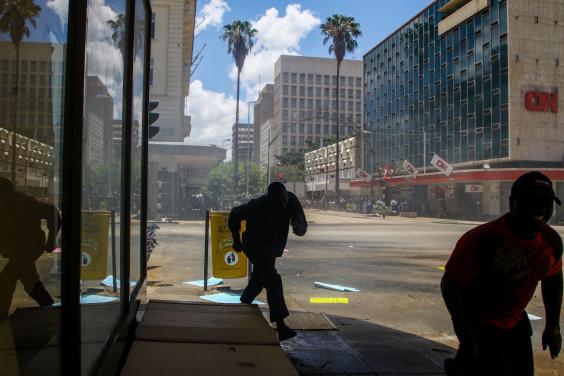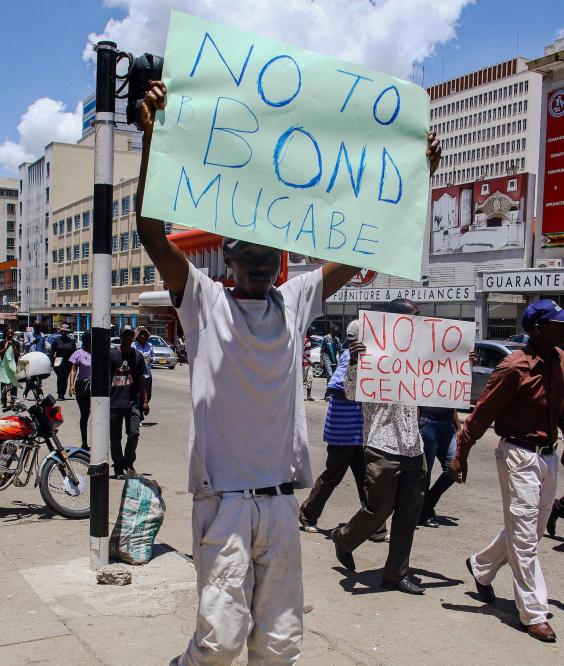Police clashed with protesters against the new ‘bond notes’ in Harare on Wednesday, amid reports vendors are already demanding more than the currency’s 1 – $1 face value
It may be in its infancy, but Zimbabwe’s new “bond note” currency is already coming under fire as some vendors refuse to accept it at face value.
Introduced by Robert Mugabe’s government on Monday as part of a desperate bid to stave off a cash flow crisis, the green notes are supposed to be traded 1 – 1 with the US dollar.
Zimbabwe abandoned its own currency in 2008 and officially adopted the American currency as its own. But continued economic uncertainty led people to stash dollars outside the country, prompting a critical shortage.
In Harare on Wednesday afternoon, a small group of protesters declaring “No To Bond Notes” took to the streets of the central business district.
Though no more than 100 turned out from the opposition Movement for Democratic Change (MDC) and the pressure group Tajamuka, they were quickly routed by riot police wielding water cannons and rubber truncheons.
But overt political protests were just one indication that the new currency was struggling. Reports from Harare suggest black market money traders are demanding $1.25 in bond notes for every dollar, while even established businesses like petrol stations were charging more to customers who wanted to use the notes.
“These bond notes signal the end of Mugabe and the Zanu-PF [ruling political party], because some retailers are already saying we must pay more for something if we pay in bond notes. So the black market has begun,” Evans Rutate, credit controller at a South African clothes chain in Harare, told the Cape Argus.
Zimbabwe’s News Day newspaper reported clashes between security guards and angry shoppers at one supermarket which flatly refused to accept the new notes.
Shop attendants said they could not accept the notes because they feared the use of counterfeits, and the government – which sprung the news of the new currency on Saturday, distributed it to banks on Sunday and entered it into circulation the next day – had not given them enough information about security features.
Mobile phone videos being shared widely online have added to fears there could already be fakes in circulation. They show brand new notes being rubbed against white paper and leaving behind a white smear – suggesting a lack of quality. The Reuters news agency said it had performed a similar experiment which also left behind a green smear.
Even the state-owned Herald newspaper reported on issues with take-up, saying fuel attendants at one petrol station had been ordered not to accept the notes by supervisors.
But it claimed the notes had mostly “continued to gain public confidence”, and quoted one vendor saying the problem was really that “we [Zimbabweans] don’t want to embrace change”.
John Mangudya, governor of the Reserve Bank of Zimbabwe, denied the new currency had been sprung on the public unfairly. “There was no ambush at all. That’s the normal standard process of introducing new notes. Banks were advised on Sunday,” he said.
Those behind the protest in Harare said the new currency was being used to get genuine dollars back into circulation. The notes themselves cannot be used outside of Zimbabwe.
“We are not going to embrace bond notes,” Hardlife Mudzingwa, a spokesman for Tajamuka, told the AFP news agency.
“They are being used to mop up the US dollars that people have in their accounts so that top government officials can import their personal goods.”
If it proves a success, the new currency could kickstart Zimbabwe’s failing economy, which has seen government officials paid their salaries late for every single month this year.
But others feared a repeat of Zimbabwe’s last doomed dollar which, before it was scrapped altogether, saw inflation reach 500 billion per cent.-.independent.









